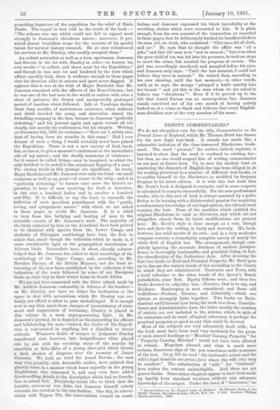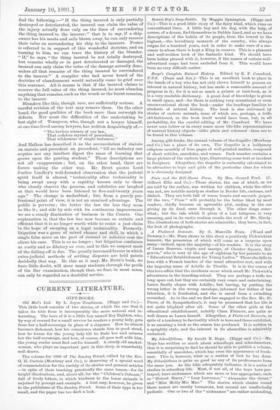BRETT'S COMMENTARIES* WE do not altogether care for the title,
Commentaries on the Present Laws of England, which Mr. Thomas Brett has chosen for his new legal text-book. It sounds too much like a colourable imitation of the time-honoured Blackstone trade- mark. The word " present," the author, indeed, explains, is inserted to show that the work is confined to existing law ; but then, no one would suspect him of writing commentaries on our past or future laws. Up to now the student bent on mastering the elements of English law has been obliged to do his reading piecemeal in a number of different text-books, or to confine himself to the Blackstone, as modified by Serjeant Stephen in his latest edition. It is with this last work that Mr. Brett's book is designed to compete, and in some respects is calculated to compete successfully. For the non-professional reader, who in this sort of book is always assumed by a polite fiction to be burning with a disinterested passion for acquiring a rudimentary knowledge of our legal system, the old text-book remains the best. None of the qualities which entitled the original Blackstone to rank as literature, and which are not altogether absent from its latest modifications, are present here. Mr. Brett's style is clear enough as a rule, though here and there the writing is hasty and slovenly. His book, however, has solid merits of its own ; and in a very moderate compass contains a remarkably complete survey of nearly the whole field of English law. The arrangement, though com- pletely ignoring the accurate divisions of modern jurispru- dence, is thoroughly businesslike and practical, being, in fact, the classification of the Judicature Acts. After devoting the first two books to Real and Personal Property, Mr. Brett goes on to discuss the various heads of law according to the Courts in which they are administered. Contracts and Torts, with a brief reference to the other heads of the Queen's Bench jurisdiction, come first. Equity follows next ; and then two books devoted to adjective law,—Practice, that is to say, and Evidence. Bankruptcy is next considered, and those odd bedfellows—Probate, Divorce, and Admiralty—which our system so strangely links together. Two books on Eccle- siastical and Criminal Law bring the work to a close. Constitu- tional and Administrative Law, the latter mostly the creation of statute, are not included in the scheme, which, in spite of its omissions and its want of logical coherency, is perhaps for practical purposes as good as any that could be devised. Most of the subjects are very adequately dealt with ; but the book must have been read very carelessly for the press, or such absurd headings as "Mischief Causing Property " for " Property Causing Mischief " would not have been allowed to remain. Misprints abound, and what is much more serious, disastrous slips of the pen sometimes make nonsense of the text. On p. 955 we read " the husband's actual and the wife's legal domicile are primei facie where the wife (sic) may be resident." The substitution of " wife " for " husband " here makes the context unintelligible. And there are yet graver faults. Some minor chapters appear to have been made up hastily from standard treatises, without any adequate knowledge of the subject. Under the head of " Insurance," we • Commentaries on tho Preeont Laws of England. By Thomas Brett, of tho Middle Tomlo, Barrister-at-Law, LL.B., B.A., dm. 9 vole. London : William Olowee and Pone. 1890. find the following :—" If the thing insured is only partially destroyed or deteriorated, the insured can claim the value of the injury actually done only on the lines of surrendering the thing insured to the insurer;" that is to say, if a ship- owner has his masts and sails blown away, he can only recover their value on surrendering his ship to the insurers. Porter as referred to in support of this wonderful doctrine, and on 'turning to him, we can trace the history of the blunder. " If," he says, " the thing insured be not totally destroyed, but remains wholly or in part deteriorated or damaged, the insured can only claim the value of the damage actually done, unless all that remains of the thing insured be surrendered 'to the insurer." A compiler who had never heard of the doctrine of abandonment would naturally come to grief over 'this sentence. All it means is that if the insured claims to recover the full value of the thing insured, he must abandon anything that remains, such as the wreck or the burnt remains, to the insurer.
Blunders like this, though rare, are sufficiently serious. A careful revision of the text may remove them. On the other hand, the good qualities of the book more than outweigh its defects. Nor must the difficulties of the undertaking be lost sight of. Tennyson, who, though not a lawyer himself, at one time lived among lawyers, has written despairingly of,- " The lawless science of our law, That codeless myriad of precedent, That wilderness of single instances."
And Hallam has described it as the accumulation of statute on statute and precedent on precedent, " till no industry can acquire nor any intellect digest the mass of learning that grows upon the panting student." These descriptions are not all exaggeration ; but, on the other hand, there are forces making the other way. Mr. Brett quotes Lord Justice Lindley's well-founded observation that the judicial spirit itself is altered, "technicality after technicality is being swept away with a rapidity known only to those who closely observe the process, and subtleties are laughed at that would have been listened to five-and-twenty years ago." The change is undoubted ; but, from a purely pro- fessional point of view, it is not an unmixed advantage. The public is perverse ; the better the law the less they seem to like it ; and side by side with its continuous improvement we see a steady diminution of business in the Courts. One explanation is, that the law has now become so certain and efficient that it is no longer worth while to resist a just claim in the hope of escaping on a legal technicality. Formerly, litigation was a game of mixed chance and skill, in which a single false move on the .part of counsel or solicitor cost the client his case. This is so no longer; but litigation continues as costly and as dilatory as ever, and to this we suspect most of the falling-off is due. The greatly increased favour in which extra-judicial methods of settling disputes are held points decidedly that way. Be this as it may, Mr. Brett's book, we have little doubt, will steer many students through the perils of the Bar examination, though that, we fear, in most cases, oan only be regarded as a doubtful service.

































 Previous page
Previous page